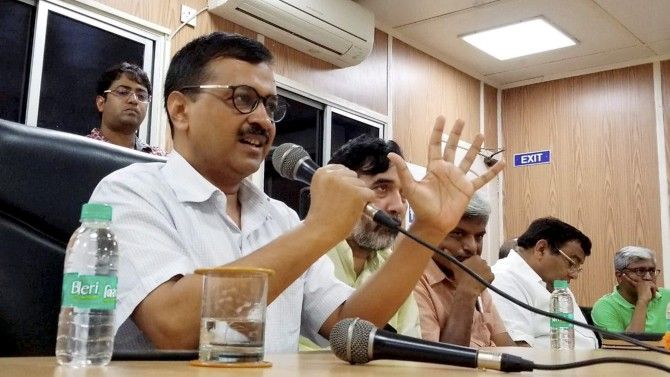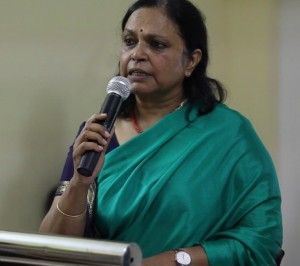'He is a former civil servant and has complete control over the administrators.'
'He should have sorted it out before it reached such a stage.'
'How did he allow the stalemate to go on for so many days?'

Arvind Kejriwal and his ministers ended their nine-day dharna at the lieutenant governor's office after LG Anil Baijal wrote to the CM, urging him to meet the bureaucrats.
The dharna at the LG's office began on June 11 over an alleged strike and non-cooperation by IAS officers.
The stand-off between the Delhi government and the IAS officers began after Delhi Chief Secretary Anshu Prakash was allegedly assaulted by AAP leaders at Kejriwal's residence in February.
"Unlike the governor of a state who can only report to the President of India, the Constitution has given the LG the power to administer. The LG is not like a governor, he has actual administrative powers," K Sujatha Rao -- former Union health secretary and a 1974 batch IAS officer -- tells Rediff.com's Shobha Warrier.
Arvind Kejriwal accused IAS officers of being on strike while at a press conference they said they were not. Who is responsible for creating such a paralysis in Delhi?
There was a breakdown of trust between the two parties and so in a way, both were responsible. You need two hands to clap.
The chief minister and his colleagues should not have treated the IAS officers in the manner in which they were treated.
Political power does not mean you can treat people as you like. Then, the incident involving the chief secretary happened.
The IAS officers needed an expression of regret and an assurance from the CM that such instances would not recur.
They have been very hurt and this they chose to show by not attending to calls or meetings convened by the ministers.
So, in a way the political class was responsible for creating the situation.
At their press conference the IAS officers said they skipped only meetings where they felt their safety and self-respect were at risk.
How can they say that?
I agree that some unfortunate incidents have taken place, but it would be an exaggeration to say they feared for their safety.
At the same time, I do agree that some ministers have not been civil with the officers, resulting in tension building up for quite some time.
Is it not justifiable for IAS officers to protest after the chief secretary was allegedly assaulted and some senior officials were humiliated publicly?
Any assault or uncivil behaviour towards an IAS officer, or any employee for that matter, is unacceptable and not justified.
So in that sense, the IAS officers feeling hurt and angry is understandable.
Yet, I do feel and wish they had found a better way of sorting out the issue than this non- cooperation.
Ultimately, in this standoff, it is the public that suffered and that is something that cannot be justified no matter what the provocation.
IAS officers, in the current scheme of things, have to work with an elected government as after all, it is the people who elect their representatives.
Moreover, the IAS officers enjoy a very privileged position under the Constitution.
With privilege and power comes responsibility as well. Otherwise, what is the difference between IAS officers and a trade union?
I do wish the LG, the chief minister and the chief secretary could have sat down and sorted out the issues earlier.

You tweeted asking how can the IAS officers be so irresponsible?
They were irresponsible in the sense that they did not attend to their duties.
There are various forums to register their complaint. They could have written to the prime minister, the home minister or filed an FIR, which they have and complained to the LG.
IAS officers do not have the option to define what work they will do and choose what they will not do.
It is a part of their work to attend meetings convened by the CM or the ministers for discussing public matters.
Of course, their grievance had to be addressed seriously and my sympathies are with them.
But an effort to resolve the crisis should have been pursued more assiduously.
After Kejriwal wrote to the association offering his apologies and assuring their safety, you felt the IAS officers should have ended the strike.
Yes, what more did they want?
Before they start working, they should meet and tell the CM categorically that those kind of incidents should not be repeated, no name-calling or violence.
Let there be a proper framework for them to work in dignity and mutual respect.
In fact, I would not blame the IAS officers or Kejriwal for the impasse.
I find the LG's role very disturbing.
After all, he is a former civil servant and has complete control over the administrators.
He should have sorted it out before it reached such a stage.
He should have ensured that public welfare was not affected in any way.
How did he allow the stalemate to go on for so many days?
Not one or two days but 10 days with politicians and four months by IAS officers as alleged by the politicians.
It was not as if he had tried and failed.
Finally, as seen, his one phone call ended the farce.
When there is a breakdown of trust and communication between two parties, the appropriate authority should intervene immediately.
After all, in this case, the LG is the administrator of Delhi Union territory with all powers vested in his person over the administration.
He could have sorted out the issues if he wanted to.
The IAS officers association said it was apolitical and neutral and was being victimised. Do you feel that way?
I feel both became victims.
Both had grievances and the LG could have intervened without wasting any time.
Unlike the governor of a state who can only report to the President of India, the Constitution has given the LG the power to administer.
The LG is not like a governor, he has actual administrative powers.
Do you feel the LG should be blamed for what happened in Delhi for 10 days?
Who am I to say who is to be blamed?
All I am saying is, unlike in a state where the chief minister has complete authority over the IAS officers, Delhi is different.
In the states, IAS officers would not have been able to do what they did in Delhi and get away.
In Delhi, there are three stakeholders -- the LG, the chief minister and the bureaucracy.
The chief minister has accountability to people, but no power.
The LG has all the power, but no accountability.
And the bureaucracy is expected to be accountable to the CM, the LG as well as the DoPT (department of personnel and training) of the Union government!
That is the asymmetry of power in Delhi.
In the current situation, when there was a stalemate and a breakdown of communication and trust, the LG should have intervened immediately. That's all I am saying.
When you were working as a bureaucrat, did any incident of this kind taken place?
Never.
I have witnessed very uncivil behaviour.
There was also an instance where an IAS officer was killed by MLAs. But I have never seen a chief secretary being called in the middle of the night and being assaulted. Whether he was hit or shouted at is not relevant.
The fact that any such incident should happen in the presence of and at the residence of the CM is what makes it even more unacceptable.
And to that extent, the IAS officers are justified in being hurt and angry.
Now that the LG has intervened to bring in a truce, do you think he should have done this much earlier and not allowed this impasse to reach this level?
Yes, most certainly.
I think the LG could have acted much, much, earlier and not allowed this unedifying drama to have taken place as it has brought credit to no one in the process.
What steps should be taken so that situations like these do not occur again?
Well, the long term and stable solution is for the central government and Parliament to deliberate upon the status of Delhi once and for all and ensure that whatever be the model, there is a symmetry in power and responsibility.
But then whatever be the system, its working depends on the people implementing it.
All stakeholders need to put public service uppermost and believe in the power of dialogue.











 © 2025
© 2025